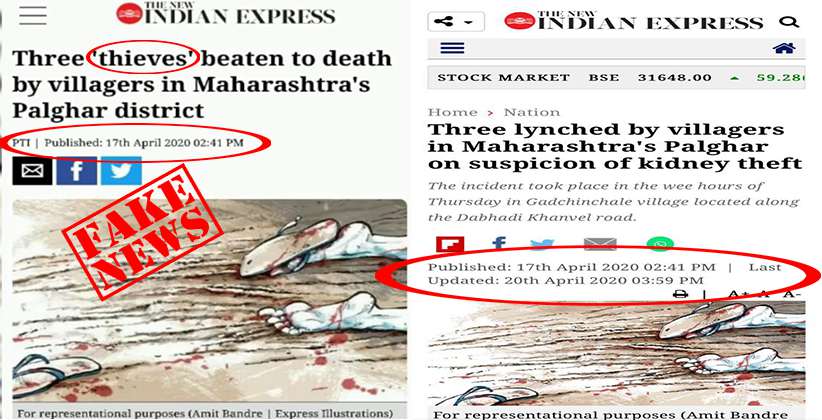The role of media plays a very crucial role in our country. The media is treated as the fourth pillar of the democracy. But some media houses are derailing from their moral responsibilities of fair journalism. Media houses such as The New Indian Express described those Mahants as thieves, without even verifying the facts of the matter. Hours later, the said media channel corrected the news headline, however, by then the false news headline had already reached to thousands of people.
On April 16, 2020 a group of villagers in Palghar district of Maharashtra dragged out three men out of their car and beat them to death on suspicion that they were thieves. The attack on the three took place amid a nationwide lockdown. Two among the three men killed were Saadhus and one was their driver.
Few videos, purportedly of the gruesome incident, have gone viral on social media. The disturbing visuals have resulted in nationwide outrage with hashtags like Palghar and lynching trending on Twitter in India.
To verify the veracity of the news, in an exclusive interview, LawStreet Journal contacted Mr. Hemant Katkar , who is the Public Relations Officer (PRO) to the SP (Palgarh), wherein he disclosed that the two guilty officers were being suspended for dereliction of duty. The names of the suspended officers are Anand Rao Kale, API and Sudhir Katare, ASI.
Fact be stated, the said persons were Saadhus who were going with their driver to a funeral. But the villagers misconceived them as thieves and attacked them leading to their death.
The Police Officials in charge, the DM of the area and the local authorities have verified the claim that they werent thieves and were Mahants who were going to attend a funeral.
A police official said that villagers stopped the vehicle on the Dhabadi- Khanvel road near village Gadchinchale when the three were on their way to Surat to attend a funeral. The locals then pulled out of the three from their car and attacked them with stones and other objects on suspicion that they were thieves. The three were identified as Chikne Maharaj Kalpavrukshagiri (70), Sushilgiri Maharaj (35) and their car driver Nilesh Telgade (30).
The officer with the Kasa Police station stated that, Prima facie information indicates that the trio were mistaken for thieves and attacked. The villagers were on edge due to the ongoing lockdown and unavailability of essential supplies. For the past few days, several rumours have been doing the rounds on social media about thieves and dacoits targetting villages on the highway. As a result, villagers have been patrolling the highway and stopping late night travellers on suspicion.
The victims are believed to be local religious leaders from Kandivali, who had first tried to take the National Highway to Silvassa but were stopped by police officials enforcing the lockdown. They seem to have then decided to take the longer route through Vikramgadh in Palghar.
The New Indian Express posted article headline as Three Thieves beaten to death by villagers in Maharasthras Palghar. This depicts how irresponsible some media channels are.
A person may find himself in trouble under the following sections of law if he is seen to be spreading or inculcating the spread of fake news: The people spreading fake news viz., the Content Creator and the Content Forwarder are usually punished under Sections 153A, 153B, 295A, 500, and 505 of the Indian Penal Code,1860 (IPC) they state:
- Section 153A punishes the offenses relating to promoting enmity between different groups on grounds of religion, race, place of birth, residence, language, etc., and doing acts prejudicial to maintenance of harmony.
- Section 153B of the IPC safeguards the interests of class of persons and national integration by providing punishment against imputations and assertions that would be considered prejudicial to national integration.
- Section 295A deals with actions that intend to outrage religious feelings of any class by insulting its religion or religious beliefs.
- Section 500 deals with punishment for defamation when the information is aimed at tarnishing the reputation of a person/persons.
- Section 505 of the IPC particularly deals with spreading of false and mischievous news intended to upset the public tranquility.
In the above-mentioned provisions of IPC, punishments can range from a period of two years to five years or a fine can be imposed or both.
The ways to tackle this problem of fake news circulation are media literacy, application of reasoning and scientific approach. Apart from these measures, suggestions to the government for tackling this problem would be to bring a law to make the dissemination of Fake News a punishable offence, to make the appropriate changes in the IT Act 2000 along with technical assistance in order to trace the origin of such information for imposing the liability and creating awareness about this menace for all people in their respective languages.






